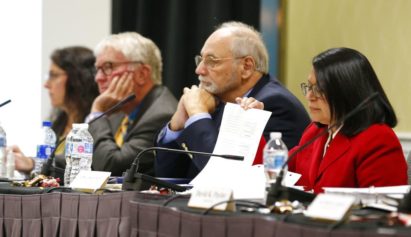As the U.S grapples with how to reduce the deficit without devastating the crippled economy, the nation could save as much as $17 billion a year—and substantially improve the conditions of the African-American community—if it stopped sending so many men to prison for non-violent offenses related to drug use and instead focused on education and treatment, according to a comprehensive study by researchers from Meharry Medical College in Nashville.
In a study published today in Frontiers in Psychology, the researchers looked at the correlation between incarceration and substance use in the African American community. They found that although the rate of violent and property crime in the U.S. decreased substantially between 1960 and 2008, the incarceration rate in that period increased drastically, largely due to incarcerations for non-violent offenses—which made up more than 60 percent of the incarcerations.
African-American males overwhelmingly bear the brunt of this increase—the incarceration rate of African-American males jumped more than 500 percent between 1986 and 2004.
According to current statistics, between one-quarter to one-third of black men will be incarcerated at some time in their lives. While African Americans comprise only 14 percent (42 million) of the U.S. population, they comprise 38 percent of the jail population.
The study shows the mind-boggling impact that drug-related incarceration has had on the U.S. economy. State governments spend one-fourth of their budgets on correctional facilities, a cost largely due to substance-related offenses, which is the fastest increasing section of the inmate population. According to the study, between 1980 and 2002, the number of persons in U.S. state prisons for substance offenses increased from 19,000 to 265,000.
“Instead of getting health care and education from civil society, African American males are being funneled into the prison system. Much of this costly practice could be avoided in the long-term by transferring funds away from prisons and into education,” says Dr. William D. Richie, assistant professor in the Department of Psychiatry and Behavioral Sciences at Meharry Medical College, lead author of the paper.
The authors chronicled the many ways that African-American families and communities are devastated by society’s inclination to jail rather than treat individuals with substance use problems. Ironically, while African Americans constituted over 85 percent of people sentenced for cocaine violations, they constitute less than 15 percent of all crack users and studies show black adolescents have lower rates of substance use than white adolescents. But when it comes to incarceration, the numbers are flipped around.
“It is essential for health care professionals to increase public awareness of substance abuse and find ways to decrease the high rates of incarceration by focusing on modifiable risk factors,” the study says. “Spending money on prevention and intervention of substance abuse treatment programs will yield better results than spending on correctional facilities. This will help to improve the quality of life especially among African Americans. Furthermore, the vast sum of money saved by the state and local governments can be utilized for the well-being of society. The incarceration of African Americans in the U.S. is high and is tied with drug use. With effective treatment of SUDs and alternatives to prison, it will save the United States significantly in economic terms.”
In addition to more treatment, Richie said that another solution would be to have more black teachers in schools during the early stages of development of black children, which would decrease the disproportionate rate of harsh disciplining of black boys that is correlated with eventual incarceration.
“From a behavioral scientific perspective, having teachers that look like the students and the parents of students from an early age could go a long way in changing perceptions of authority for black youth,” Richie said.


